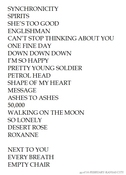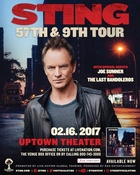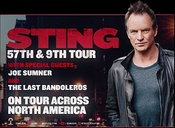
Sting gives lively Uptown crowd an evening of intimate, bucket-list memories...
This show was as much about its locale as it was its headliner: Sting, who for decades, as a solo artist and member of the Police, has filled arenas and stadiums, visited the intimate Uptown Theater on Thursday night, drawing a sold-out crowd of about 2,200 and delivering a bucket-list show for the ages.
Sting opened the evening, performing a solo-acoustic version of “Heading South on the Great North Road,” a track from “57th and 9th,” his 12th solo album, released in November. He prefaced the song with some memories of “Kansas City, Missouri” — and he made sure to say “Missouri” nearly every time he said “Kansas City” — including a Police show in March 1979 at One Block West.
After “North Road,” he turned the stage over to Joe Sumner, his eldest child, who performed a short set before bringing out the Last Bandoleros, a Tex-Mex band from San Antonio, who delivered a bristling set of roots-rock tunes. (Imagine a mix of the early BoDeans and early Los Lobos.) Sting joined them on one song, playing tambourine and laying down some harmonies.
After a brief intermission, Sting took the stage with a band that included drummer supreme Josh Freese and a choir of backup singers that comprised his son and the Bandoleros. He hit the ground running, starting with two Police songs: “Synchronicity II” and “Spirits in the Material World.”
Sting has persistently worn his activist heart on his sleeve, and though he would deliver only one overt sermon this evening, at the end of the show, the implied messages were not lost during a couple of songs, like “Englishman in New York,” and the line “I’m an alien, I’m a legal alien,” which prompted an uproarious cheer from a crowd that was loud and engaged all night.
Much of the set was devoted to “57th and 9th,” a straight-up rock album that harkens back to Sting’s days with the Police. Songs like “Petrol Head” and “One Fine Day” didn’t generate responses as raucous as his Police and better-known solo material, but they sustained the fever-pitch mood in the room.
The production deserves mention: The sound was as good as it gets in the Uptown, and the light show was dazzling.
Sting hit the home stretch in full gallop, starting with “Message in a Bottle,” which inspired one of several full-throated sing-alongs. After Joe Sumner delivered a worthwhile cover of David Bowie’s “Ashes to Ashes,” Sting sang the “57th and 9th” tune “50,000,” a song inspired by the deaths of Bowie and Prince.
Then it was a mad dash through some of his best and most beloved material: “Walking on the Moon,” “So Lonely,” “Desert Rose” and “Roxanne,” which he mashed up with several bars of Bill Withers’ “Ain’t No Sunshine.”
He opened the encore with an inflammatory version of “Next to You” and followed that with one of the Police’s biggest hits, the romantic stalker ballad “Every Breath You Take.”
The show ended like it began: Sting in a chair with an acoustic guitar. He prefaced “The Empty Chair” with a story about its origins. He wrote it for the film “Jim: The James Foley Story,” a documentary about journalist James Foley, who was held captive in Syria by ISIS for nearly two years before he was beheaded.
The song, which has been nominated for an Oscar (his fourth), is written from the point of view of someone who is incarcerated and is talking to his loved ones, imagining the day when he sees them again: “Keep my place and the empty chair / And somehow I’ll be there.”
As he introduced the song, Sting honored Foley and lamented the prevailing political climate. To paraphrase: At a time when “the truth is under attack,” he said, the world needs true journalism more than ever. And as much as any moment during this memorable show, the song and its sentiments epitomized how potently and intimately a singer can connect with his audience.
(c) Kansas City Star by Timothy Finn




